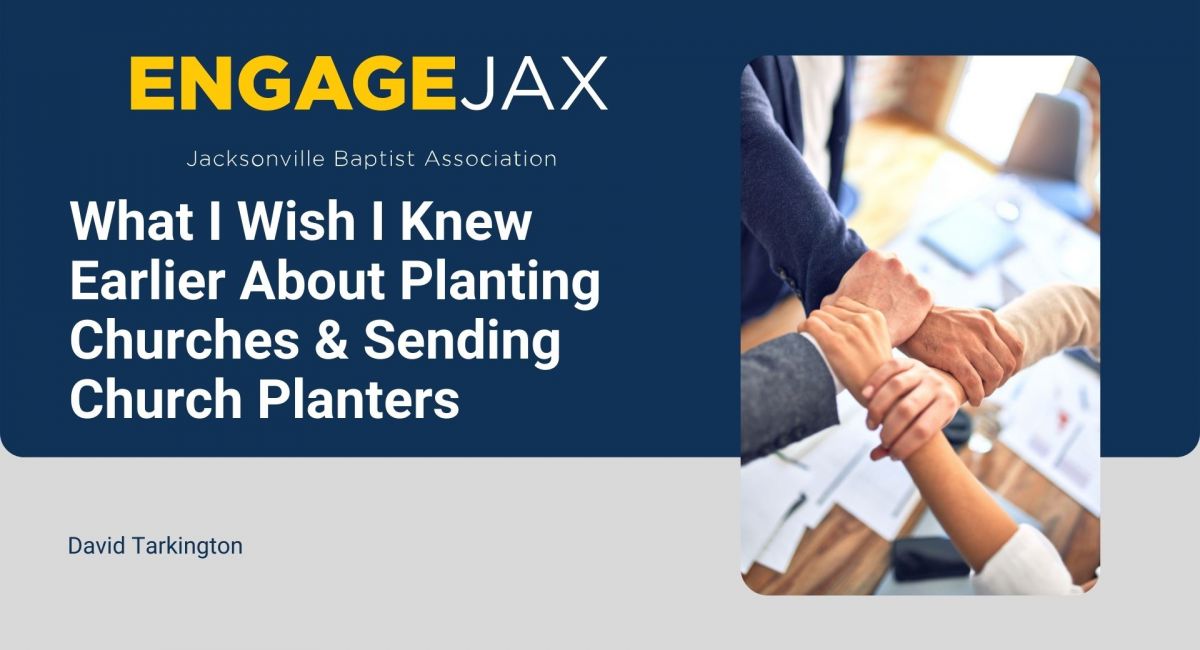
What I Wish I Knew Earlier About Planting Churches & Sending Church Planters
Church planting is considered trendy by some.
Church planting is a term that has become used greatly in the past decade or so, but in truth is not new. In fact, it is how the gospel has spread throughout the world, from city to city, community to community, and family to family since the birth of the church in the book of Acts. Church planting is so much more than a trend. If it is a trend, it has been trending for two-thousand years.
I am thankful for the men I know who are now planting churches and supporting church plants throughout our nation and world. Intentional and strategic church planting in regions and areas where local expressions of church are needed continue to happen. Our goal as a church and mine as a pastor has been to help identify the men God has called to this amazing task, to equip them, enable them, and encourage them as they serve.
Church planting is not easy. It is exciting and it always looks great on video clips and promotional pieces, but the daily grind can be very difficult. Many of the planters and families we serve with have expressed those moments of isolation, feeling forgotten by their sending church, ignored by supporters, and wondering if they may have missed God’s call.
That is why encouragement and continued support is needed.
Knowing Then What I Know Now
As a pastor of a legacy church (a nice term used to describe an old church) I have sought to help church planters, and call out men in our own church family to lead the way in this endeavor for the past decade or so. It has been a learning experience for me. The good news is that we have families serving on the field now, exactly where God desires them to be, in other cities, states, and even nations. They are truly on the front lines of gospel service as they have answered the call of God.
As I review our church’s history of church planting and preparing church planters, it is clear that all who have surrendered to this call and continue to serve in this capacity were blessed by God greatly and serve well due to many factors, in spite of our help. In other words, we did not know what we did not know, but if we had it to do over again, we (as a church and leadership) would be more strategic and intentional for the sake of our planters. In many cases, as I review each, it is clear that we may have been so enamored with the concept of planting churches and campuses that we did not rightly pray for and prepare those God placed before us.
Sadly, we helped some step into planter positions who should never have done so (at least not as soon as they did.) As a Send Network Trainer, I now go through many weeks of teaching and study with local church planters that provide information and expose blind spots early on. This type of training was mostly unavailable or ignored in our past. Therefore, our campuses and plants suffered unnecessarily.
Scott Ball, writing for the Malphurs Group lists “Ten Deadly Church Planting Mistakes” in a blog post. It is a hard read because I recognize a number of mistakes I have made in the past with our planters.
The ten mistakes are:
- Not going through assessment
- Planting without a coach
- Launching too quickly
- Leading without a team
- Launching too small
- Relying too heavily on outside funding
- Neglecting solid assimilation plans
- Installing local governance too quickly
- Waiting too long to implement a leadership pipeline
- Neglecting the process of strategic planning.
These are delineated in the blog post here. Some of these seem basic, and they are. Yet, in the excitement and joy of planting something new, often a few of these items are left to the wayside, only to be discovered to be needed and important later. Sadly, often too late.
Church Planting Goals
It is important to have vision and clarity when it comes to planting a church, but it also must be understood that there are times when our vision for a new work will help launch a church, but not sustain. In other words, the vision may seem set in stone, but after a year or so of engaging a community, attempting to grow disciples, and be the church needed in a community, that vision may change.
Anson McMahon, lead pastor of Emmaus Church near Atlanta shared his thoughts on church planting and truths discovered in the journey here. One point that resonates with me is that as a pastor I must remember that Jesus knows what he’s doing even when I often do not.
To be flexible as a church planter and pastor is an understatement. It is required because change is the only constant (well, other than God) in the journey.
What Feels Like a Failure May Be a Win
We all want to win. Winning means accomplishing the task at hand well and doing so better than others. It’s about crossing that finish line first. Yet, in church planting, what we often see as failure may actually be a victory.
It is not a failure to admit the plan is not working.
It is not a failure to shift focus.
It is not a failure to move to another area of ministry.
It may feel like failure, but it does not have to be.
Every church has a shelf-life. While the gates of hell will not prevail on Christ’s church, the local body of believers gathered as church may change or shift over time. In fact, as is the case in our city, many will find their season of service coming to an end. This has been true in America for decades. We have seen it throughout Europe for centuries. The church of Jesus Christ prevails, but sometimes, the season of service of a local body in a specific place comes to a close. This should not be so that ministry ceases, but so the next chapter of gospel-centered ministry may flourish.
As Baptists we are well-equipped in starting things like programs, events, ministries, or even church plants. We often do not recognize well when a season has ended. That is why some churches continue to have varied ministries attempting to function that were perfectly designed to reach and minister to a population who no longer exists. Thus the church lives under the banner of “We’ve always done this” wondering why there are no longer any positive results.
Sometimes a church plant (or a campus plant) served its purpose and has impacted a community well. A healthy church plant will shift from “plant” status to “church” status and engage as an autonomous family of believers. Yet, sometimes this does not happen. There are numerous reasons. Sometime blame must be placed at the foot of leaders. Sometimes this is due to outside impacts that leaders have no control over (you know, like a pandemic or increased facility rental costs.)
Regardless, the church and leaders must seek to learn from each experience. It is too easy to allow bitterness, negativity, and feelings of failure to grow.
I have seen churches and planters ignore or avoid church planting assessment. In such instances, problems have arisen in leadership that could have been addressed prior to the launching. When these issues arise months after the launch, the damage may be so severe the entire plant ceases.
This grieves me. Especially because it is avoidable.
Did You Plant a Church Or Just a Service?
This is something that I fear often creeps into our journeys of church planting. If the church plant is intended to reach an unchurched community by engaging one-on-one in the neighborhood, offering Bible studies, relationships, worship encounters, and the fullness of church to an area void of such, it means more must be done than just relocating a group of faithful servants to a new facility.
In other words, if the church plant is little more than a worship service, you have not planted a church. You have just relocated a gathering of believers to a new building. That can be a great start, but it is not a church.
Tim Keller says it best (full article here) …
You might be passionate about expositional preaching and having really good preaching, and so you want to start a church. But, if all you want is your own pulpit, that is a horrible reason to plant a church. There are plenty of other pulpits out there that you can go to, but don’t plant a church just so you can have your own. Or if you’re passionate about good liturgy or good music, don’t plant a church in order to have that. Instead, find a church that you can plug into and be a part of that because church planting is so much more than just having the desire or the ability to plan and to prepare for what makes a really good worship service. You are not an event planner; you’re a church planter, and these are two very different things. Now, planning a good worship service is of course going to be a part of church planting, but for those of you who have just started church planting or are thinking about it, you are gonna be surprised by how little of your time is actually devoted to that.
If I knew then what I know now…
Like many churches who jumped on the latest iteration of church planting in recent years, we have enjoyed the journey. We have seen lives transformed. We have heard the gospel proclaimed by those who were more silent in their personal witness prior to the new work. We have seen righteous risks taken. We have seen communities changed and great, godly things have happened.
It has been good.
Yet, we also acknowledge that there were times we ran too quickly, even ahead of our prayers and God-given vision and strategy. As a friend used to tell me “Good is the enemy of best” and we settled for good (with moments of great) but should have been wise enough to wait for best.
The Future Is Bright
We still plant churches.
We still send church planters.
We hope to do this even more in our church in the coming years. In fact, we are praying to be the sending or supporting church for forty church planters by 2040. Some megachurches can do that in about six months. For us, it will take longer. This means we must do more than drop a few dollars in the mail to a planter every now and then. It will require more than sending a mission team to another city on occasion. It will require strategic prayer and planning to send, support, and sustain church plants in our city and beyond for the long-term.
We are learning from our past. We are thankful for the lessons. We long to be wiser as we move forward.
We are reminded that God has a mission. His mission has a church. We are that church. To God be the glory.
And I tell you, you are Peter, and on this rock I will build my church, and the gates of hell shall not prevail against it. – Matthew 16:18 ESV




